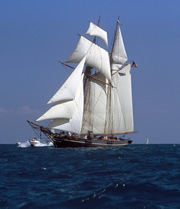Thu 18 Mar, 2010
Visiting Cuba next week
Comment now Filed under: Public appearancesTags: Cuba, D'Wolf family, Katrina Browne, Schooner Amistad, Traces of the Trade, Tracing Center
 I can now share that three of us from Traces of the Trade—director Katrina Browne, Tulaine Marshall, and I, are scheduled to travel to Cuba next week for the visit of the Amistad.
I can now share that three of us from Traces of the Trade—director Katrina Browne, Tulaine Marshall, and I, are scheduled to travel to Cuba next week for the visit of the Amistad.
We are scheduled to sail into Havana’s harbor on board the Amistad on March 25, in conjunction with the United Nations International Day of Remembrance of the Victims of Slavery and the Transatlantic Slave Trade.
We also expect to hold the Cuban premiere of the documentary, which was filmed in part on location in Cuba, in Havana on March 27.
Katrina and I have not been back to Cuba since filming Traces of the Trade, and we are eager to share the film with the Cuban people, as well as to engage in further historical research on the D’Wolf slave trade, continue the search for slave plantations owned by the D’Wolfs, and look for descendants of those enslaved by the D’Wolf family. We are also looking forward to reuniting with those who helped us make the film, including Cuban filmmaker Boris Crespo, who was our Cuban line producer.
Havana was the most common destination for slaving voyages sent out by James D’Wolf and his family, and they owned several coffee and sugar plantations near Havana and elsewhere in Cuba. The original Amistad was built in Cuba and was transporting slaves from Havana to a plantation along the coast when its slave revolt occurred.
As a result, those of us in the DeWolf family and with Traces of the Trade believe that this visit can highlight both a painful, shared regional history and the enduring cultural and historic ties between the United States and Cuba.
We are also mindful of the difficult relationship between Washington and Havana today, and of how rare contacts like this still are. As the Associated Press wire story today puts it, this visit of the Amistad to Cuba “provides a counterpoint to new and lingering tensions between Washington and Havana and stands out as a high-profile exception to the 47-year-old U.S. embargo of the Caribbean island.” The story goes on to note that when the Amistad sails to Havana, it will be flying both the U.S. and Cuban flags, and quotes U.S. Rep. William Delahunt (D-Mass.) as saying that the unusual permissions for this visit demonstrate that both governments were mindful of “the profound significance of this particular commemoration.”
The Amistad is scheduled to arrive in Matanzas, the site of a Cuban slavery museum affiliated with UNESCO, on March 22. On March 25, we will sail to Havana for another week of public events, which include participation via satellite in a press conference at U.N. headquarters, a three-hour simulcast with schoolchildren at the U.N. in New York and at other locations, and academic panels on the history of the transatlantic slave trade. Our film’s Cuban premiere on March 27 will be held at the Casa de África in Havana, and we are very fortunate that it will be hosted by Miguel Barnet, the prominent Cuban writer and ethnographer of the African diaspora.
The Amistad is also a floating ambassador for the UN Permanent Memorial to Honor the Victims of Slavery and the Transatlantic Slave Trade.